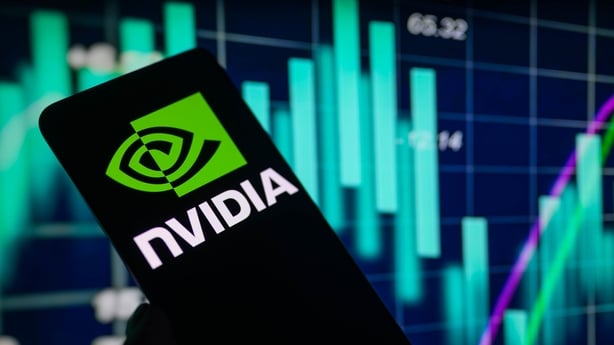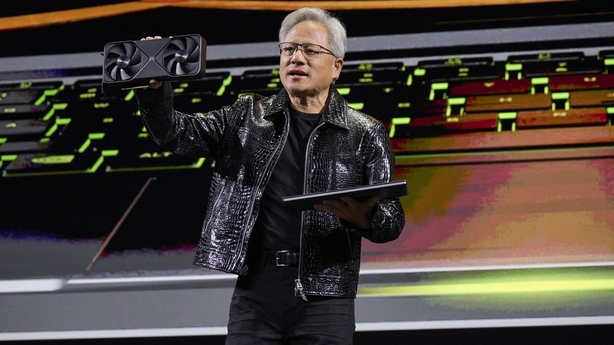Nvidia's quarterly outlook last night suggested demand from Microsoft, Amazon and other heavyweight tech companies racing to build out AI infrastructure remains robust, though the outcome failed to significantly quell fears of overspending in the booming industry.
Shares of Nvidia fell 1.5% in extended trade, trimming some of its 3.7% gain in the regular session after the dominant AI chipmaker forecast quarterly revenue above analysts' estimates.
Microsoft, Amazon, Meta Platforms and Alphabet, among Nvidia's largest customers, were mostly unchanged.
Shares of those companies, among the components of the so-called "Magnificent Seven", have delivered big returns as they raced to dominate emerging AI technology following the debut of ChatGPT in November 2022.
More recently, most of those stocks have stumbled and investors have become more cautious, especially after China's DeepSeek said it achieved significant AI performance at low cost.
While Nvidia delivered a 78% surge in quarterly revenue, it said its first-quarter margin would tighten to about 71% from 73.5%, lower than the 72.2% estimated by analysts, as it ramps production of its new flagship Blackwell AI chips.
"Despite market jitters over DeepSeek's efficient model and early Blackwell deployment challenges, Nvidia's results reaffirm that it continues to lead the AI landscape," said Jacob Bourne, an analyst at eMarketer. "Competitors are making strides but frontier models require the kind of advanced computing resources that Nvidia provides."
Still, the highly anticipated earnings report from Nvidia was met with lacklustre response from technology companies in Asia today.

Shares of Taiwan Semiconductor Manufacturing, Nvidia's main supplier of chips, slipped 0.47%, while South Korean chipmakers Samsung Electronics and SK Hynix fell 0.18% and 1%, respectively.
Tokyo's Nikkei technology sub-index was up 0.2%.
"Nvidia's earnings came with much less volatility than expected. The absence of major surprises may have kept sentiment relatively calm," said Yeap Jun Rong, a market strategist at IG.
The launch of low-cost AI models from DeepSeek last month raised fears of a pullback in spending on Nvidia's priciest AI chips and evaporated more than half a trillion dollars of its stock market value in a single day, a record on Wall Street.
Adding to worries, an analyst report suggested Microsoft was scrapping some data centre leases.
The Magnificent Seven stocks have retreated from their late-2024 peaks and the group is in correction territory, with the Roundhill Magnificent Seven down more than 11% from its December 17 closing high.
Nvidia has routinely exceeded analyst estimates over the last two years, but the magnitude of its revenue beats has narrowed as it faces tough comparisons from strong growth a year ago.
"DeepSeek rattled investors but given Nvidia's first-mover advantage and the huge infrastructure investment plans from tech giants like Meta, it's an indication that Nvidia's high-end chips will remain in demand," said Susannah Streeter, head of money and markets at Hargreaves Lansdown.
Magnificent Seven stocks added roughly $11 trillion in market capitalisation between the debut of ChatGPT in November 2022 and their combined peak in mid-December 2024, with Nvidia adding $2.7 trillion in market value, making it the world's second-most valuable company at $3.2 trillion.
Nvidia's stock has surged around 1,800% in the last five years. Magnificent Seven stocks on average more than tripled in that time, while the benchmark S&P 500 has gained about 65%.
Nvidia last night said it finished its fiscal year with record high revenue of $130.5 billion, driven by demand for its chips to power artificial intelligence in data centres.
The California-based juggernaut reported a net income of $22 billion on an unprecedented $39.3 billion in revenue in a blockbuster fourth quarter that ended in late January.
Nvidia has successfully ramped up "massive-scale" production of its new top-of-the-line Blackwell processors for powering artificial intelligence, logging billions in sales in its first quarter on the market, according to Huang.
"AI is advancing at light speed as agentic AI and physical AI set the stage for the next wave of AI to revolutionise the largest industries," Nvidia co-founder and chief executive Jensen Huang said in an earnings release.

Nvidia projected revenue of $43 billion in the current fiscal quarter, topping analyst expectations.
The earnings figures appeared to calm investor concerns that import tariffs and the surprise debut of lower-cost AI model DeepSeek from China signal less profitable days ahead for the Silicon Valley star.
"Despite market jitters over DeepSeek's efficient model and early Blackwell deployment challenges, Nvidia's results reaffirm that it continues to lead the AI landscape, sidelining skeptics," said Emarketer technology analyst Jacob Bourne.
"Competitors are making strides but frontier models require the kind of advanced computing resources that Nvidia provides," he said.
The AI boom propelled Nvidia stock prices until a steep sell-off in January triggered by the sudden success of DeepSeek.
China's DeepSeek unveiled its R1 chatbot, which it claims can match the capacity of top US AI products for a fraction of their costs.
Nvidia high-end GPUs (graphics processing units) are in hot demand by tech giants building data centres to power artificial intelligence, and a low-cost option could weaken the Silicon Valley chip star's business.
High-end versions of Nvidia's chips face US export restrictions to China, part of Washington's efforts to slow its Asian adversary's advancement in the strategic technology.
The policy's effectiveness came under scrutiny in January when DeepSeek achieved widespread adoption of its latest AI technology, developed using unrestricted lower-powered Nvidia chips.
Nvidia relies heavily on Taiwan's TSMC for the production of its graphics processing units, raising concerns it faces geopolitical risks.

